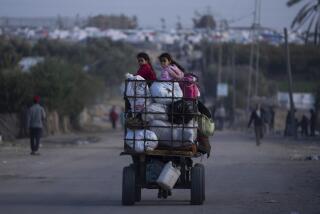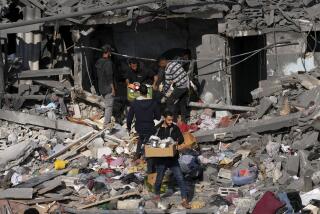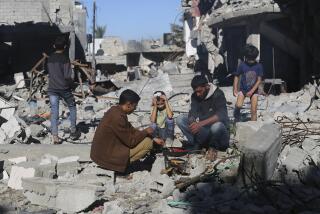Serbs Tighten Noose Around Bosnia Capital : Balkans: Last road out of Sarajevo is closed. Diplomats see effort to starve out 400,000.
- Share via
BELGRADE, Yugoslavia — Serbian rebels cinched their noose around the Bosnian capital of Sarajevo on Tuesday by sealing off the last land route out of the city and firing on U.N. peacekeepers who approached their tank positions to appeal for an end to the siege.
The fiercely intensified Serbian offensive, launched while the Western world’s attention has been diverted by a U.S.-led mission to aid Somalia, probably signals the start of a campaign to starve the 400,000 Sarajevo holdouts into submission, diplomats in this Yugoslav and Serbian capital said.
Food supplies have been exhausted in Bosnia-Herzegovina, where fighting and so-called ethnic cleansing have driven 2 million people from their homes and exposed them to disease spreading through communities without heat, electricity or water.
Observers here speculate that as attacks intensify and more of Sarajevo’s defenders succumb to winter cold and malnutrition, Serbian negotiators in Geneva are more likely to win mediators’ acceptance of their offer to grant peace in exchange for land.
Bosnian Serbs, with the help of Serbian sponsors throughout the former Yugoslavia, have already seized 70% of Bosnia-Herzegovina and expelled non-Serbs in their quest for an “ethnically pure” Serbian nation reaching from Hungary to the Adriatic Sea. Bosnian Croats have capitulated to the forced division in exchange for control over much of the remaining territory.
But Sarajevans of all ethnic backgrounds, and the Muslim Slavs who made up the largest ethnic group in Bosnia, have been fighting against the Serbs’ rending of their homeland; until earlier this year, Bosnia epitomized the Yugoslav ideal of multicultural tolerance and integration.
In an indication that the Serbs would like to clear Sarajevo of its civilian population, the Bosnian Serb news agency SRNA announced late Tuesday that it would facilitate evacuations from the besieged city.
It invited “all Serbs, Croats, Muslims, Yugoslavs, Jews and all other citizens, regardless of their nationality and religion, all those wishing so, to prepare themselves to leave Sarajevo, which is threatened by famine and a cold winter.”
Tuesday marked a full week since the Office of the U.N. High Commissioner for Refugees in Geneva was forced to suspend its humanitarian airlift to Sarajevo because of fighting. Sylvana Foa, an agency spokeswoman, said prospects are dim for resuming the effort to feed Bosnia’s starving. “All our staff are in bunkers. The airport has already taken several rounds of shooting,” Foa told journalists in Geneva.
She said radar equipment at the airport had been damaged by shelling, and it is “highly unlikely” that relief flights will resume today as earlier envisioned.
Sarajevo is already exhibiting signs of hunger and deprivation, Foa said, referring to her agency’s field reports of a huge increase in child beggars and adults so emaciated they show little likeness to their identity card photos.
Fighting in Bosnia subsided somewhat last month as the combatants largely adhered to a cease-fire negotiated by U.N. commanders on Nov. 12. But massive shelling from Serb-held positions erupted a week ago, prompting the Muslim-led Sarajevo government to accuse the rebels of using the latest truce as cover to move tanks and heavy guns into position for a final offensive against the shattered capital.
Serbian tanks early Tuesday moved onto the sole open road out of the city--the shell-pocked highway leading west from the government-held center to the Sarajevo airport--blocking any further escape and cutting the city off from the outside world.
French troops assigned to Sarajevo to assist in the U.N. humanitarian relief effort told the Reuters news agency that mediators were repelled by gunfire when they approached Serbian positions to remind the rebels that they have repeatedly agreed to keep the vital airport route open for U.N. convoys.
“There is a disturbing atmosphere of opportunism with this latest offensive,” a European diplomat in Belgrade commented. “The (Serbian) rebels seem to think no one is watching Bosnia any more because of the focus on Somalia and have concluded they can make their move now.”
Other observers surmised that Bosnian Serbs are trying to force U.N. and European Community officials at Yugoslav peace talks in Geneva to accept their plan for an ethnic carve-up of Bosnia.
Milos Vasic, a prominent military analyst in Belgrade, speculated that as death and disease take their toll on the isolated Bosnian capital, Serbian warlord Radovan Karadzic will wear down U.N. and EC mediators’ resistance to the ethnic division his guerrillas have already imposed by force.
Karadzic has insisted the war will end only if Serbian forces win exclusive control over most of the republic, which would then be annexed to the rump Yugoslav state consisting of Serbia and Montenegro.
Bosnian leaders have lamented that the talks in Geneva serve to endorse Serbian strong-arm tactics by affording equal treatment of their territorial fait accompli with government proposals put forward through peaceful diplomacy.
Bosnian Foreign Minister Haris Silajdzic and the leader of Bosnian Croat forces, Mate Boban, refused Tuesday to meet with Karadzic in Geneva to go over his map of the proclaimed Serbian Republic of Bosnia-Herzegovina.
Before the Serbian rebellion against Bosnian independence, Muslim Slavs accounted for 44% of Bosnia’s 4.4 million people, with Serbs comprising 31% and Croats 17%.
The official death toll from eight months of fighting in Bosnia exceeds 17,000, but the statistics cover only the small Muslim-held area. More than 100,000 others--mostly Muslim civilians--are missing and presumed dead or are being held in Serbian detention camps.
More to Read
Sign up for Essential California
The most important California stories and recommendations in your inbox every morning.
You may occasionally receive promotional content from the Los Angeles Times.














